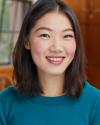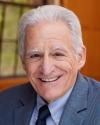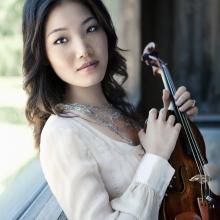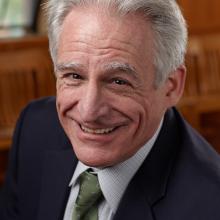Faculty colleagues Rachel Lee Priday and Craig Sheppard present a blockbuster program including the Schubert D Major Sonatina, Fauré Sonata No. 1, and Bartók Sonata #1 for Violin and Piano.
Program
Sonatina in D Major, D384 (1816): FRANZ SCHUBERT (1797-1828)
Allegro molto
Andante
Allegro vivace
Sonata in A Major, Opus 13 (1875-76): GABRIEL FAURÉ (1845-1924)
Allegro molto
Andante
Scherzo: Allegro vivo
Finale: Allegro quasi presto
INTERMISSION
Sonata #1 in C sharp minor, Sz.75 (1921): BÉLA BARTÓK (1881-1945)
Allegro appassionato
Adagio
Allegro
Program Notes
A very short reflection on tonight’s program
The Schubert Sonatina in D, D384, was one of three such works composed in 1816 when Schubert was 19. It is more light-hearted than the other two sonatinas (A minor and G minor) and much simpler in substance than the great four-movement C Major Fantasy that Schubert wrote eleven years hence, within a year of his death. We tend to view the loss of such a unique and great spirit at a very young age as tragic. All the more reason to be grateful for the gaiety and spontaneity that inform this charming youthful work.
The Fauré Sonata in A for Violin and Piano, Opus 13, was composed at the age of 30. Even though Fauré’s career lasted nearly another fifty years, during which he composed another violin sonata, two cello sonatas, a piano trio, two piano quartets, two piano quintets, and a string quartet, this sonata remains arguably his most popular chamber music composition. In addition, he composed numerous works for solo piano and many songs (for which he has justifiably been called ‘the King of French Lieder’). Fauré was also a noted composition teacher and headed the Paris Conservatoire from 1905 to 1920, counting amongst his pupils Maurice Ravel, George Enescu, and Nadia Boulanger.
Opus 13 is replete with wonderful moments. The sweeping melodic lines in the first movement give way to the pulsating rhythm of the second, that of a heart that resonates both reflection and ecstasy. The alternating two, three, and five-bar phrases in the scherzo are a delight, keeping both performers and the audience on their toes. The last movement’s more passionate moments belie a delicacy that is at the core of Faure’s spirit.
The Bartok Sonata #1 in C sharp minor is one of the great works in chamber music literature. Although violin and piano rarely have the same melodic material, the rhythmic vitality and constant mood changes are beautifully synchronized throughout. Written in the early 1920s when atonality was gaining popularity, clashing minor sevenths and ninths, tritones, and the intricate juxtaposition of other major and minor intervals, are all offset by an extraordinary lyricism, even in the angst-ridden first movement. The mysterious and foreboding coda of the first movement gives way to heartbreaking intensity in the opening violin solo in the slow movement, a feeling that is repeated in different guises several times during the rest of the movement. The manic drive in the last movement, incorporating folk melodies that Bartok brought back from the Hungarian provinces, is interrupted by moments of great humor and wit, and lots of wild dancing! It all comes to an exhilarating close in the major key.
—Program Notes Copyright Craig Sheppard 2024.
Biographies

Violinist RACHEL LEE PRIDAY (PRY-day) is a passionate and inquisitive explorer in all her musical ventures, in search of contemporary relevance when performing the standard violin repertoire, and in discovering and commissioning new works. Her wide-ranging repertoire and eclectic programming reflect a deep fascination with literary and cultural narratives.
Rachel Lee Priday has appeared as soloist with major international orchestras, including the Chicago, Saint Louis, Houston, Seattle, and National Symphony Orchestras, the Boston Pops, and the Berlin Staatskapelle. Recital appearances have brought her to eminent venues including the Mostly Mozart Festival at Lincoln Center, Musée du Louvre, Verbier Festival, Ravinia Festival and Dame Myra Hess Memorial Series in Chicago, Mecklenburg-Vorpommern Festival in Germany, and tours of South Africa and the United Kingdom.
Committed to new music, and making enriching community and global connections, Rachel takes a multidisciplinary approach to performing that lends itself to new commissions organically merging poetry, dance, drama, stimulating visuals and music. Recent seasons have seen a new Violin Sonata commissioned from Pulitzer Prize Finalist Christopher Cerrone and the premiere of Matthew Aucoin’s “The Orphic Moment” in an innovative staging that mixed poetry, drama, visuals, and music. Rachel has collaborated several times with Ballet San Jose, and was lead performer in “Tchaikovsky: None But The Lonely Heart” during a week-long theatrical concert with Ensemble for the Romantic Century at the Brooklyn Academy of Music (BAM). Her work as soloist with the Asia America New Music Institute promoted new music relationships and cultural exchange between Asia and the Americas, combining new music premieres and educational outreach in the US, China, Korea and Vietnam.
Rachel began her violin studies at the age of four in Chicago. Shortly thereafter, she moved to New York to study with iconic pedagogue Dorothy DeLay, and continued her studies at the Juilliard School Pre-College Division with Itzhak Perlman. Rachel holds a B.A. degree in English from Harvard University and an M.M. from the New England Conservatory, where she studied with Miriam Fried. Since Fall 2019, she serves as Assistant Professor of Violin at the University of Washington School of Music.
Recent and upcoming concerto engagements include the Pacific Symphony, Buffalo Philharmonic, Johannesburg Philharmonic, Kwazulu-Natal Philharmonic, Stamford Symphony, and Bangor Symphony. Since making her orchestral debut at the Aspen Music Festival in 1997, she has performed with numerous orchestras across the country, such as the symphony orchestras of Colorado, Alabama, Knoxville, Rockford, and New York Youth Symphony. In Europe and in Asia, she has appeared at the Moritzburg Festival in Germany and with orchestras in Graz, Austria, Hong Kong, Singapore, and Korea, where she performed with the KBS Symphony, Seoul Philharmonic and Russian State Symphony Orchestra on tour.
Rachel has been profiled in The New Yorker, The Los Angeles Times, Family Circle, and The Strad. Her concerts have been broadcast on major media outlets in the U.S., Germany, Korea, South Africa, and Brazil, including a televised concert in Rio de Janeiro, numerous radio appearances on 98.7 WFMT Chicago radio, and American Public Media’s Performance Today. She been featured on the Disney Channel, “Fiddling for the Future” and “American Masters” on PBS, and the Grammy Awards.
Praised by the Chicago Tribune for her “irresistible panache,” Rachel Lee Priday enthralls audiences with her riveting stage presence and “rich, mellifluous sound.” The Baltimore Sun wrote, “It’s not just her technique, although clearly there’s nothing she can’t do on the fingerboard or with her bow. What’s most impressive is that she is an artist who can make the music sing… And though her tone is voluptuous and sexy where it counts, she concluded the ‘Intermezzo’ with such charm that her listeners responded with a collective chuckle of approval as she finished.”
She performs on a Nicolo Gagliano violin (Naples, 1760), double-purfled with fleurs-de-lis, named Alejandro.

Craig Sheppard is Professor of Piano at the School of Music of the University of Washington in Seattle. He is also Professor of the Advanced Innovation Center at the China Conservatory in Beijing, and his former students hold positions in conservatories and universities throughout the world.
A veteran of over fifty years on the international stage, in the past few seasons he has performed both Shostakovich’s 24 Preludes and Fugues and Bach’s The Art of Fugue in venues throughout the United States, as well as London, Manchester (UK), Jerusalem, Shanghai and Beijing’s Forbidden City Concert Hall, in addition to giving masterclasses at all of the above.
As recording artist, his LPs and CDs have appeared on the Sony, Chandos, Philips, EMI and AT-Berlin labels. He has published 26 CDs with Romeo Records (NY) since 2005, including the complete Beethoven sonatas (Beethoven: A Journey), the Six Bach Partitas, the Inventions and Sinfornias, both books of The Well Tempered Clavier, the last three Schubert sonatas, Liszt’s Années de Pèlerinage I and II, Debussy’s 24 Preludes and 12 Études (including both books of Images and Estampes), the 24 Preludes and Fugues of Shostakovich, Late Piano Works, Opus 116-19, of Johannes Brahms, and Bach’s Die Kunst der Fuge (The Art of Fugue).
Within the past two decades, he has traveled many times to the Far East for performances and masterclasses, including Japan, Korea, China, Hong Kong, and Singapore. He has performed at the Nehru Memorial Library in New Delhi, held a residency at the Melba Conservatory in Melbourne, Australia, and performed three times in New Zealand, including the first ever public performances of both books of Bach’s Well Tempered Clavier. Most recently, he performed the Complete Chopin Nocturnes at the Museu do Oriente in Lisbon.
Born in Philadelphia in November, 1947, Craig Sheppard graduated from both the Curtis Institute and the Juilliard School, studying with Eleanor Sokoloff and Sasha Gorodnitzki respectively. He also worked with Rudolf Serkin and Pablo Casals at the Marlboro Festival, and later with Ilona Kabos, Peter Feuchtwanger and Sir Clifford Curzon in London. During his early years, in addition to a successful début at New York’s Metropolitan Museum of Art, he won top prizes in the Busoni, Ciani, and Rubinstein competitions. However, it was his Silver Medal at the Leeds International Piano Competition in 1972 that brought him to international attention. Moving to London in 1973 and living there for the next twenty years, Sheppard taught at Lancaster University, the Yehudi Menuhin School, and the Guildhall School of Music and Drama. He also performed on multiple occasions with all the major British orchestras and with many on the European continent, under such conductors as Sir George Solti, Erich Leinsdorf, Kurt Sanderling, James Levine, Michael Tilson Thomas, Aaron Copland, Lord Yehudi Menuhin, Sir Charles Mackerras, Sir Andrew Davis, Sir John Pritchard, Esa-Pekka Salonen, David Zinman, and Leonard Slatkin. In the United States, he has performed with the orchestras of Philadelphia, Boston, Chicago, Atlanta, Dallas, San Francisco, Rochester and Seattle, and many others.
Craig Sheppard’s solo repertoire is eclectic, comprising nearly fifty solo recital programs and more than sixty concerti covering a wide spectrum within the Western canon. He also has a great love of chamber music and has collaborated with many great instrumentalists and singers, including Wynton Marsalis, José Carreras, Victoria de los Angeles, Irina Arkhipova, Ida Handel, Sylvia Rosenberg, Mayumi Fujikawa, the Cleveland, Emerson and Miró string quartets, and many musicians of the younger generation, including James Ehnes, Stefan Jackiw, Richard O’Neill, Edward Arron and Johannes Moser.
Sheppard is invited frequently to serve on the juries of distinguished international competitions, including most recently the Arthur Rubinstein International Piano Master Competition in Tel Aviv in May of 2021 and the National Society of Arts and Letters in Chicago in 2022. He also returns regularly to the Jerusalem Music Center to perform and teach, as well as the Chetham’s Summer School in Manchester, UK. With colleague Dr. Robin McCabe, Sheppard is Co-Founder and Artistic Director of the Seattle Piano Institute, a boot camp for aspiring young pianists held every July at the University of Washington, this summer celebrating its 14th anniversary.

